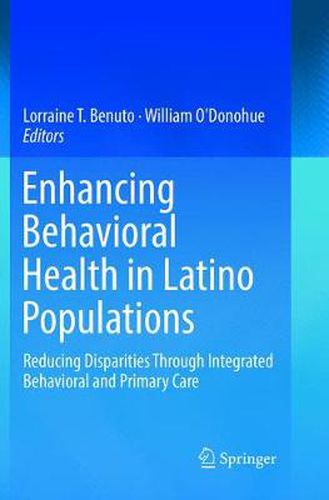Readings Newsletter
Become a Readings Member to make your shopping experience even easier.
Sign in or sign up for free!
You’re not far away from qualifying for FREE standard shipping within Australia
You’ve qualified for FREE standard shipping within Australia
The cart is loading…






This title is printed to order. This book may have been self-published. If so, we cannot guarantee the quality of the content. In the main most books will have gone through the editing process however some may not. We therefore suggest that you be aware of this before ordering this book. If in doubt check either the author or publisher’s details as we are unable to accept any returns unless they are faulty. Please contact us if you have any questions.
This timely volume examines the potential of integrated care in providing effective, accessible behavioral healthcare for Latino clients. The integrated care model is discussed in practical terms, with guidelines for the addressing the needs of Latinos in a coordinated, patient-focused setting. Specific points of attention include common behavioral and medical/mental health conditions (e.g., depression, chronic pain, tobacco use), special considerations in working with Puerto Rican and Cuban clients, and recommendations for working with children. These important issues are considered against the backdrop of opportunities and challenges inherent in integrated care and its implementation, in addition to the relevance of evidence-based interventions for this large and diverse population.
Among the topics covered:
Latino trends and health policy: from walking on eggshells to commitment
Integrated health care for Latino immigrants and refugees: what do they need?
Using a translator in integrated care settings
Enhancing and improving treatment engagement with Hispanic patients
Integrated depression care among Latinos
Chronic disease management and integrated care among Hispanic populations
Health psychologists, social workers, family physicians, and clinical psychologists will find Enhancing Behavioral Health in Latino Populations an important resource for their professional development, as well as part of the ongoing movement toward reduced disparities and more inclusive and culturally attuned care.
$9.00 standard shipping within Australia
FREE standard shipping within Australia for orders over $100.00
Express & International shipping calculated at checkout
This title is printed to order. This book may have been self-published. If so, we cannot guarantee the quality of the content. In the main most books will have gone through the editing process however some may not. We therefore suggest that you be aware of this before ordering this book. If in doubt check either the author or publisher’s details as we are unable to accept any returns unless they are faulty. Please contact us if you have any questions.
This timely volume examines the potential of integrated care in providing effective, accessible behavioral healthcare for Latino clients. The integrated care model is discussed in practical terms, with guidelines for the addressing the needs of Latinos in a coordinated, patient-focused setting. Specific points of attention include common behavioral and medical/mental health conditions (e.g., depression, chronic pain, tobacco use), special considerations in working with Puerto Rican and Cuban clients, and recommendations for working with children. These important issues are considered against the backdrop of opportunities and challenges inherent in integrated care and its implementation, in addition to the relevance of evidence-based interventions for this large and diverse population.
Among the topics covered:
Latino trends and health policy: from walking on eggshells to commitment
Integrated health care for Latino immigrants and refugees: what do they need?
Using a translator in integrated care settings
Enhancing and improving treatment engagement with Hispanic patients
Integrated depression care among Latinos
Chronic disease management and integrated care among Hispanic populations
Health psychologists, social workers, family physicians, and clinical psychologists will find Enhancing Behavioral Health in Latino Populations an important resource for their professional development, as well as part of the ongoing movement toward reduced disparities and more inclusive and culturally attuned care.